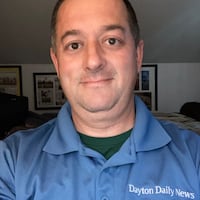Clark is also a 1999 University of Dayton graduate. His parents graduated from UD. He met his wife at UD. His son Connor is a senior at the school now. He was in town this weekend to visit his son and attend the men’s basketball game Saturday against Richmond.
Clark had plenty of reasons then to give his opinions on Grant’s comments.
Speaking from the professional standpoint on behalf of the AGA, Clark said, “Of course, this should never happen, and of course he’s right to feel that way, to defend his team that way. Professionally, my observation was, of course, this is inappropriate and anybody doing this clearly has a gambling problem and needs to be seeking help.”
Clark joined the AGA in September 2017. He said his experience tells him the bettors targeting the Dayton players are likely not new bettors taking advantage of newly-legalized sports betting in Ohio but people who have been engaging in the illegal betting market for a long time.
“They shouldn’t be engaging in the product at all,” Clark said. “Clearly, they’ve got an issue. So professionally, it sent up a lot of red flags for me and for our membership.”
On a personal level, Clark took Grant’s comments to heart because of a deep connection to Dayton. His dad, Joe Clark, kept score for Dayton basketball games at the UD Fieldhouse when he was a student in the 1960s. Casey grew up going to games at the arena and then took his own kids there.
“Dayton basketball is sacred in my house,” Clark said. “It’s very personal. I could see it was for coach Grant, too. I’m hopeful what we’re doing with legalization in Ohio, which has been true in other markets, is we’re migrating bettors out of the pervasive and predatory illegal market that is operating entirely in the shadows into a regulated marketplace where we have visibility and where regulators have an ability to do something.”
Back for more @DaytonMBB with my fellow Flyer/son. Come on Flyers! pic.twitter.com/1D24xWY6FF
— Casey Clark (@caseyclarkdc) March 12, 2022
#Dayton6th #FutureFlyers pic.twitter.com/7lyxFefRQC
— Casey Clark (@caseyclarkdc) January 28, 2023
Other coaches in the Atlantic 10 Conference took note of Grant’s comments and made their own comments in press conferences in the days that followed.
After a 76-69 victory against Dayton on Jan. 21, George Washington coach Chris Caputo supported Grant by saying, “If you are that much of a loser that you form a fake Twitter or Instagram account to go harass kids who play college basketball — I think coach Grant said something about how they have to re-evaluate their priorities. I can’t imagine anybody who would do that. I would say it’s a lot of fake tough guys behind anonymous handles. Where I’m from, when you have a problem, you†go talk to him in person. I would just say it’s a gutless and it’s embarrassing for those people and we totally stand by the Dayton program as it relates to that. One of our own players got something after the game on Monday. Just complete clowns.”
While not tying his comments to sports gambling, Massachusetts coach Frank Martin responded to comments about his team he’s seen on social media on Jan. 21.
“There’s some people that have opinions on social media that I’ve dealt with personally already,” Martin said, “and believe me, me and them will have a man to man when the season is over. I don’t create problems, I treat people with respect. But anyone that comes after my players by name, and being critical of them, me and them got a problem for life. Anyone comes after my family, me and them got a problem that’s gonna get fixed.”
“It is a shame when people claim to be UMass people, and they wanna be negatively critical of college kids that are being demanded to go to class, to work, to come in the gym day and night to become better players. And people attack them personally on social media.”
Clark sees the comments by Grant and the other coaches as important because they bring visibility to the problem.
“What I would add to that is that there’s zero daylight between the way the industry feels and the way coach Grant feels,” Clark said. “Nobody thinks that anyone should be harassed based on betting wins or losses. There should be an appropriately heightened sensitivity when that includes amateur athletes.”
About the Author
